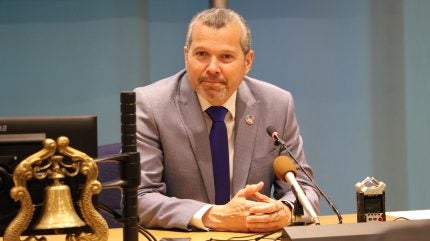
The International Maritime Organization (IMO) has initiated a legally binding framework aimed at achieving net-zero greenhouse gas (GHG) emissions from ships by 2050.
This decision was agreed during the 83rd session of the Marine Environment Protection Committee (MEPC 83), which took place from 7 to 11 April 2025.
The IMO Net-Zero Framework is notable for being the first to incorporate mandatory emissions limits and GHG pricing within the global shipping industry. It is expected to be formally agreed by the IMO in October this year in an extraordinary session of MEPC.
The US government, however, chose to withdraw from the global negotiations, stating that it would not support any agreement that “unduly or unfairly burdens the US.”
A diplomatic demarché sent to other IMO delegates by the US representation, reported by Reuters, stated: “The US rejects any and all efforts to impose economic measures against its ships based on GHG emissions or fuel choice.
“Should such a blatantly unfair measure go forward, our government will consider reciprocal measures so as to offset any fees charged to US ships and compensate the American people for any other economic harm from any adopted GHG emissions measures.”
The reversal of policy is in line with much of President Trump’s isolationist position regarding the international community, especially on the environment. The language used also mirrored his words on trade, including his regard of trade imbalance as the US being “ripped off”.
The IMO discussions continued despite the withdrawal of the US.
Pacific Environment, an environmental organisation based in the US, denounced the Trump Administration’s move to leave the discussions and said it was vital other member states continued and agreed, as they later did.
Pacific Environment executive director Shannon Wright said: “The US government’s exit from the International Maritime Organization talks are a significant lost opportunity to engage in discussions that could drive economic growth domestically. The work doesn’t stop here. IMO member countries still have an opportunity to reach a critical decision to reduce shipping emissions.”
The regulations proposed under the Net-Zero Framework include a new fuel standard for vessels and a global emissions pricing mechanism, which are expected to be implemented in 2027.
These regulations will target large ocean-going vessels exceeding 5,000 gross tonnage (gt), responsible for 85% of CO2 emissions from international shipping.
The fuel standard will mean “ships must reduce their annual greenhouse gas fuel intensity (GFI) – that is, how much GHG is emitted for each unit of energy used. This is calculated using a well-to-wake approach.”
To support this initiative, the IMO will establish the Net-Zero Fund, which will collect contributions from emissions pricing.
The revenue generated will be used to incentivise low-emission ships, foster innovation and infrastructure in developing nations, and provide training and capacity building to aid in the implementation of the IMO GHG Strategy.
The IMO Net-Zero Framework will be included in a new Chapter 5 of Annex VI (Prevention of air pollution from ships) to the International Convention for the Prevention of Pollution from Ships (MARPOL).
A rare vote was conducted to advance the measures, demonstrating that a majority of member states were in favour of sending them to the next MEPC meeting for further consideration. IMO and MEPC votes must usually be unanimous, but that rule was cast aside with the US refusing to participate.
IMO Secretary-General Arsenio Dominguez stated: “The approval of draft amendments to MARPOL Annex VI mandating the IMO net-zero framework represents another significant step in our collective efforts to combat climate change, to modernise shipping and demonstrates that IMO delivers on its commitments.
“Now, it is important to continue working together, engaging in dialogue and listening to one another, if we are to create the conditions for successful adoption.”
Jamie Yates, climate policy analyst at Pacific Environment said the result of MEPC 83 was disappointing, despite the progress Dominguez said was achieved.
“If maritime shipping was a country, it would be the sixth-largest polluter and its emissions are growing. This is a significant moment where the International Maritime Organization has delivered targets but failed to meet its own ambition on delivering a just and equitable transition and properly incentivizing sustainable long-term fuel and technology solutions.”



